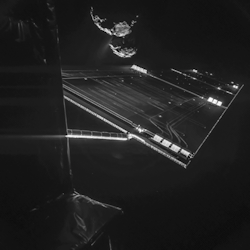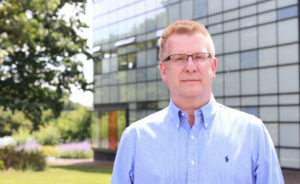You are here
- Home
- OU scientist showing how application of space technology can help the global climate crisis
OU scientist showing how application of space technology can help the global climate crisis

It’s called technology transfer, when innovations in one field are used with a different goal than the original purposes – often in a different industry.
Space technology must meet high standards, needs to be reliable and failure-proof and that’s why OU space scientist Dr Geraint ‘Taff’ Morgan has been invited on an interdisciplinary panel of experts to debate how innovation in technology, business, and policy can help to create a Net Zero food system
The STFC Food Network COP26 Festival panel session is taking place to coincide with the 2021 United Nations Climate Change Conference, COP26, and will discuss, innovations for carbon neutral food systems. The panel will look at what opportunities lie ahead and will cover innovations coming from policy, business modelling, consumer choice and science and technology, along with how these interlink.
Dr Morgan says space science can provide solutions to the global climate crisis because the team has a unique blend of multi-disciplinary backgrounds:
“More than anything, success is based on the people in the team and their ability to work together from start to finish to solve complex problems and come up with elegant solutions. That’s what makes our team in the Space Science Discipline in the Space Strategic Research Area (Space SRA) at The Open University unique.

Dr Geraint "Taff" Morgan
“In space research, because of the very nature of the work and the fact that you have to try and create a complete solution to a problem before you launch, taking in both scientific aims and all the mission constraints, you need to have as many different skills sets as possible within your team. It really is about the people, with scientists (chemists, physicists, geologists, biologists, etc) and engineers (hardware, electrical, thermal, software, etc) from different disciplines all contributing their unique perspective to the final solution. Whilst also recognising, as demonstrated by AstrobiologyOU, the importance of engaging with social scientists to ensure that the technical solution developed meets the needs of the target end-user, especially in the developing world.”

Left to right: Dr Simona Nicoara, Dr Sonia Garcia Alcega and Dr Lisa Kates
Dr Morgan says many people assume space science is just about satellites and astronauts, but the technology his team has developed goes much further than that:
“Whilst Earth Observation satellites will continue to play a very important role in our understanding of our climate and the impact of humans on the planet, planetary exploration missions will also continue to push the boundaries of science and engineering and force us to continue thinking outside of the box – developing new tools and know-how, which can be translated back to Earth to solve challenges, like climate change. Very similar to F1, our designs have to be low power, low mass but also be strong to survive shock and vibration; however, there are no mains plug sockets in space and no mechanics with a spanner or screwdriver on the Moon or Mars.”
He adds:
“Through working in partnership with domain experts, we will continue developing new solutions to tackle the impact of food production and agriculture on climate change, building on our track-record of existing projects funded by the STFC Food Network.”
Dr Morgan will be joined on the panel by, Sonal Choudhary (PI, Sheffield University) Christian Reynolds (City University) Bob Doherty (York).
The Science and Technology Facilities Council (STFC) Food Network+ (SFN) brings together STFC researchers and facilities with research and industry in the agri-food sector.
Jason Green, STFC Associate Director for External Innovation, said:
“STFC is present at every stage of the innovation life cycle, from fundamental science research to entrepreneurial applications. When our scientists are looking to the skies to find out more about our universe and how it came to exist, they do so with the most cutting-edge technology available.
“In STFC we encourage those brilliant minds to then take this pioneering technology and apply it to address real-world problems here on Earth.
“It is with this goal in mind that the Food Network+ was born, and it’s incredibly rewarding to see the work of Taff and others making a real impact to some of the most pressing challenges, such as climate change and food security.”
Taff is highly active in analytical chemistry and the space technology translation agenda at The Open University. The first half of his career was spent developing instruments for the Rosetta and Beagle2 space missions. Having successfully analysed a comet, he has since led research teams to develop a wide range of bespoke, high impact, sector disruptive solutions to terrestrial challenges, including developing the award-winning air quality monitoring system for use on all future UK submarines and instruments for the world’s largest flavours and fragrance company.
The STFC Food Network + has allowed him to work with end-users to develop novel sniffing solutions for: determining the shelf-life of rocket salad, identifying avocados damaged or infected with fungi and earlier detection of Campylobacter in chicken farms.
In partnership with the Scotch Whisky Research Institute and IBM Research UK his team is developing methods to authenticate Scotch whisky and with funding from the Partnership for Clean Competition they are developing sports anti-doping screening tests. Taff is a Founder/Director of four start-up companies.
Original article published on OU News 2/11/21: OU scientist showing how application of space technology can help the global climate crisis
Latest News
- Congratulations Professor Geraint (Taff) Morgan! 8th April 2025
- AstrobiologyOU 5 Year Report 4th March 2025
- PhD Opportunities Open For Applications 13th November 2024
- A potential breakthrough in battle against antibiotic resistance 23rd September 2024
- Introducing Professor Schwenzer 19th July 2024